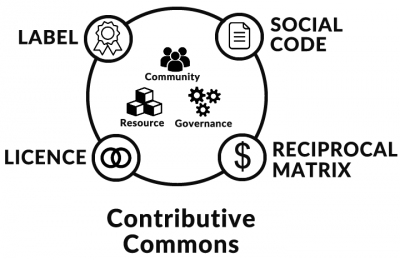Contributive Commons as Tools for Reciprocity
This page is a translation of french page Contributive Commons : des outils pour une réciprocité. (Feel free to correct the english...)
The site Contributive Commons (Facebook Page) comes from an first article of analysis and reflection about [Commons-Based_Reciprocity_Licenses reciprocity licenses] (such as Peer Production License) wrote by Maïa Dereva. This article being very long (15 pages), the site propose short fact sheets to synthesize the key ideas of this proposal.
Key issues:
Synthesis
After analyzing the reciprocity licensing proposals and previous studies on the subject, the conclusion seems to be that a reciprocity license can't reflect alone all the necessary conditions for regulation of commercial transactions from provided that they are authorized for commons. In particular, it seems compromised to draft consensus terms since they are based on moral values.
More than a license, the Contributive Commons propose a set of articulated tools in order to create the conditions for a reciprocal transaction between a common and contributors :

- A Contributive Commons Label which is a peer-to-peer self-agreement.
The is intended for community members who identify as commons. He has an incentive and pedagogical purpose. It allows the generic definition of the commons (lowest common denominator) Examples : Move Commons – Unisson
- A Contributive Commons Licnese : inspired by Commercial Creative Commons licenses (CC BY and CC BY SA), it adds conditions to the commercial use of common.
The license defines the general conditions of access and diffusion, but it withdraws the conditions of commercial use in a different document called social code.
- A Social Code : text that defines the bundles of qualities, values, rights and wealth of the common, and contains a reciprocal matrix.
The terms of commercial use and transactions are set by each common and explained through its social code including a reciprocity matrix (which can be considered the equivalent of a commercial contract). Eaemple : Social Code of french association Semeoz
- A Reciprocity Matrix : equivalent to a rate schedule that clearly indicates contributors conditions of payments depending on the use made of the common. This matrix is in the social code.
Examples : FreePlayMusic (23 rates based on the use) – French reciprocity agreement of a third place
- A money : unencrypted and abundant, it is just to clarify the interaction between the labeled commons.
This money, which is not essential to the implementation of the Contributive Commons, would be dedicated to commons exchanges in order to promote the economy of the commons and secure these exchanges compared to the external market. Examples : Local Exchange Trading Systems, WIR, SME (balanced monetary union, in French), KRONOS